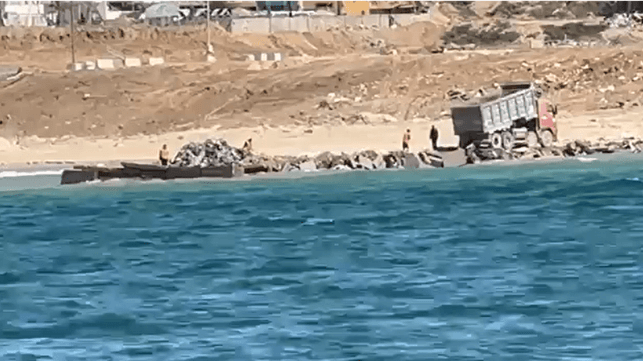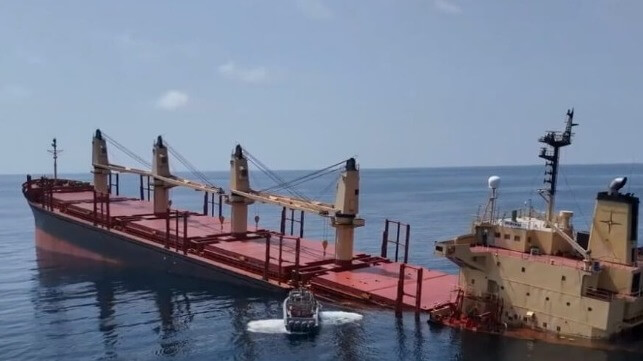Two NGOs Complete a "Crazy" Aid Delivery to Makeshift Pier in Gaza

The first port-free maritime shipment of aid to Gaza has been delivered, despite the risks of operating a barge near the surf zone without a formal pier, and a second is about to get under way.
NGOs World Central Kitchen (WKC) and Open Arms towed a small barge with about 200 tonnes of food aid to the coast of Gaza last week and delivered it alongside at a homemade jetty. (Gaza does not have any substantial port infrastructure.)
WKC acknowledged in advance that the delivery would be a risky attempt, with a high chance of failure - but said that it would be worth accepting the hazards because of the looming famine in Gaza.
A video of the operation shows the improvised nature of the pier, which might give commercial vessel operators pause. The dirt-and-rubble jetty extended out from an unprotected beach, no more than a hundred yards out from the surf zone. The tug did not approach the shore directly; instead, two RIBs guided the barge in to its berth. It was moored with its beam to the far point of the jetty, with breasting wires to hold it steady. A mobile crane hoisted the pallets off onto a truck for shoreside delivery.
"You knew we had to go to Gaza, had to give it a shot, even if it was crazy," said Open Arms founder Oscar Camps, addressing World Central Kitchen's Chef Jose Andres in a social media message. "You called up another crazy person, and we did it."
The next shipment will be delivered by a merchant vessel, the Jennifer, accompanied by an anchor-handling tugboat for maneuvering and cargo handling. The second shipment will include a large consignment of dates, which have spiritual significance during Ramadan, WKC said in a statement.
Aid groups say that these maritime shipments (and parallel U.S. and EU initiatives) are only necessary because Israel has sealed most land crossings into Gaza, prohibiting or sharply restricting aid. The northern half of the strip is most severely affected, as it is the furthest from the limited crossings near the Egyptian border.
Over the weekend, the UN Office for the Coordination of Humanitarian Affairs (OCHA) said that "there is no alternative to the large-scale delivery of aid by land." The White House and the EU's aid coordinator made similar acknowledgements in a statement early last week.
"[The famine] is manmade," said EU foreign policy chief Josep Borrell. "When we look for alternative ways of providing support by sea, by air, we have to remind [ourselves] that we have to do it because the natural way of providing support through roads is being . . . artificially closed."
The Red Sea Crisis, Food Insecurity and Conflict

[By Saba Sinai]
The Yemeni Houthi rebels’ continued attacks on shipping in the Red Sea serve as a reminder that global supply chains remain highly vulnerable to disruption. Moreover, it highlights how food insecurity can simultaneously be an effect and cause of conflict.
To address this, the international community must move quickly to combine its hard and soft power, mitigating the push and pull factors leading people to terrorism, violence, and piracy—factors that include food insecurity itself.
The UN Food and Agriculture Organization defines food security as ‘when all people, at all times, have physical, social and economic access to sufficient, safe and nutritious food that meets their dietary needs and food preferences for an active and healthy life’. The latest UN statistics suggest that 691 million to 783 million people are food-insecure, many of them in fragile and conflict-affected states.
This latest disruption in Red Sea maritime traffic has historical precedent. The name of the maritime area in question is Bab el-Mendab, which translates to ‘the gate of lamentations’ or ‘the gate of grief’. In the current episode of the maritime drama, the grief for millions of people who depend on the life-giving goods transiting through this narrow strait may yet wax greater.
The Houthis’ disruption of Red Sea maritime traffic has already significantly affected the global movement and price of goods for some nations. Container traffic has slowed, and 95% of the container shipping that once sailed through the Red Sea is now often diverted around Africa, adding nearly 5000km to the voyage in some cases. The additional distance is already significantly increasing the cost of such essentials as food, medicine and fuel. For the same reason, the Red Sea attacks are increasing the price of inputs for food and agriculture.
For the globe’s most vulnerable populations, cost increases of this kind threaten to exacerbate pressures on food security and precipitate the kinds of downstream consequences that erode prosperity and security, fueling conflict.
In response to Houthi attacks on shipping in the Red Sea, ongoing since the 19 November hijacking of an Israeli-linked ship, Galaxy Leader, the US initiated the multinational Operation Prosperity Guardian to protect maritime safety in the waters around Yemen. The operation received implicit endorsement from a UN Security Council resolution passed on 10 January. The next day, the US and Britain launched strikes against Houthi targets in Yemen.
Until 11 January, it seemed Operation Prosperity Guardian would only respond to Houthi attacks if the group successfully damaged civilian or military vessels. Some may read the two-month delay in responding to Houthi attacks as a vulnerability in the international system ripe for exploitation.
It’s unlikely that a state, perhaps except Iran, whose government has form on this matter in the Strait of Hormuz, would engage in such tactics around the world’s eight most important maritime chokepoints. They are Bab el-Mandeb at the Horn of Africa; the Strait of Hormuz in the Persian Gulf; the Suez Canal, Egypt; the Panama Canal, Panama; the Strait of Gibraltar, between Spain and Morocco; the Strait of Malacca between Malaysia, Singapore and Indonesia; the Turkish Straits, Turkey; and the Cape of Good Hope, South Africa.
Whether by design or accident, the Houthis renown has received a boost from the maritime attacks. Other non-state actors may get inspiration from the Houthis’ use of these attacks to achieve political, ideological and military objectives. Of particular concern are the militant groups that operate around Bab el-Mendeb.
Beyond the immediate challenge of maritime terrorism and insurgency, events in the Red Sea are a reminder of the role of food insecurity in conflict. As former WFP executive director David Beasley outlined, ‘there is plenty of information on how conflict impacts food security, but there is very little evidence on how food insecurity can drive conflict or how food security might contribute to the building of more peaceful societies’.
Nevertheless, food insecurity can sometimes be linked to factors that promote conflict: the recruitment of combatants; mortality and morbidity rates that undermine stability in already fragile societies; disputes over land and water in resource-constrained settings; and the mass displacement of food-insecure people. The 1992 famine in Somalia illustrated how food insecurity could accentuate political, economic or social dysfunction.
The tragic irony of the Houthis attacks is that hunger is rife across Yemen itself, where 17 million people are food-insecure. Food insecurity has undoubtedly continued to undermine peace and stability in Yemen. It has been exacerbated by the conflict there and used to radicalise Yemenis to the Houthis’ cause. Strikes on Houthi positions and facilities through Operation Prosperity Guardian or otherwise under the Security Council resolution could deepen Yemen’s humanitarian disaster if such action harms civilians or civilian infrastructure.
Governments and multilateral bodies, particularly through the UN, must work to secure maritime trade to avoid food insecurity contributing to further conflict in the Middle East and beyond.
Saba Sinai is a lecturer in agriculture at CQUniversity, Australia and a fellow with ASPI’s Northern Australia Strategic Policy Centre. The views expressed here are his own and do not necessarily represent those of his employer.
The opinions expressed herein are the author's and not necessarily those of The Maritime Executive.
No comments:
Post a Comment